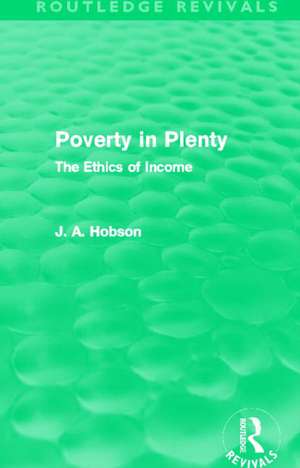Poverty in Plenty (Routledge Revivals): The Ethics of Income: Routledge Revivals
Autor J. Hobsonen Limba Engleză Hardback – 16 iul 2012
Din seria Routledge Revivals
-
 Preț: 258.66 lei
Preț: 258.66 lei - 9%
 Preț: 1038.45 lei
Preț: 1038.45 lei - 9%
 Preț: 934.94 lei
Preț: 934.94 lei -
 Preț: 238.40 lei
Preț: 238.40 lei -
 Preț: 294.72 lei
Preț: 294.72 lei -
 Preț: 258.52 lei
Preț: 258.52 lei - 9%
 Preț: 903.41 lei
Preț: 903.41 lei - 18%
 Preț: 695.85 lei
Preț: 695.85 lei -
 Preț: 296.10 lei
Preț: 296.10 lei -
 Preț: 342.36 lei
Preț: 342.36 lei - 9%
 Preț: 764.28 lei
Preț: 764.28 lei -
 Preț: 317.54 lei
Preț: 317.54 lei - 9%
 Preț: 619.48 lei
Preț: 619.48 lei -
 Preț: 258.66 lei
Preț: 258.66 lei -
 Preț: 245.10 lei
Preț: 245.10 lei - 9%
 Preț: 903.80 lei
Preț: 903.80 lei - 9%
 Preț: 832.07 lei
Preț: 832.07 lei -
 Preț: 153.81 lei
Preț: 153.81 lei -
 Preț: 258.66 lei
Preț: 258.66 lei -
 Preț: 294.97 lei
Preț: 294.97 lei -
 Preț: 200.66 lei
Preț: 200.66 lei -
 Preț: 199.85 lei
Preț: 199.85 lei -
 Preț: 308.89 lei
Preț: 308.89 lei -
 Preț: 295.04 lei
Preț: 295.04 lei -
 Preț: 382.23 lei
Preț: 382.23 lei - 9%
 Preț: 606.35 lei
Preț: 606.35 lei -
 Preț: 343.21 lei
Preț: 343.21 lei -
 Preț: 258.66 lei
Preț: 258.66 lei -
 Preț: 230.80 lei
Preț: 230.80 lei - 9%
 Preț: 640.90 lei
Preț: 640.90 lei -
 Preț: 256.94 lei
Preț: 256.94 lei -
 Preț: 257.67 lei
Preț: 257.67 lei - 9%
 Preț: 801.69 lei
Preț: 801.69 lei -
 Preț: 228.88 lei
Preț: 228.88 lei -
 Preț: 259.47 lei
Preț: 259.47 lei -
 Preț: 368.93 lei
Preț: 368.93 lei - 9%
 Preț: 764.34 lei
Preț: 764.34 lei -
 Preț: 246.37 lei
Preț: 246.37 lei -
 Preț: 326.26 lei
Preț: 326.26 lei -
 Preț: 286.98 lei
Preț: 286.98 lei - 8%
 Preț: 432.15 lei
Preț: 432.15 lei -
 Preț: 258.66 lei
Preț: 258.66 lei -
 Preț: 267.15 lei
Preț: 267.15 lei -
 Preț: 295.10 lei
Preț: 295.10 lei -
 Preț: 259.68 lei
Preț: 259.68 lei - 5%
 Preț: 231.22 lei
Preț: 231.22 lei -
 Preț: 339.90 lei
Preț: 339.90 lei -
 Preț: 389.43 lei
Preț: 389.43 lei -
 Preț: 302.13 lei
Preț: 302.13 lei -
 Preț: 294.72 lei
Preț: 294.72 lei
Preț: 594.98 lei
Preț vechi: 800.03 lei
-26% Nou
Puncte Express: 892
Preț estimativ în valută:
113.85€ • 119.17$ • 94.76£
113.85€ • 119.17$ • 94.76£
Carte tipărită la comandă
Livrare economică 01-15 aprilie
Preluare comenzi: 021 569.72.76
Specificații
ISBN-13: 9780415623285
ISBN-10: 0415623286
Pagini: 94
Dimensiuni: 138 x 216 mm
Greutate: 0.33 kg
Ediția:1
Editura: Taylor & Francis
Colecția Routledge
Seria Routledge Revivals
Locul publicării:Oxford, United Kingdom
ISBN-10: 0415623286
Pagini: 94
Dimensiuni: 138 x 216 mm
Greutate: 0.33 kg
Ediția:1
Editura: Taylor & Francis
Colecția Routledge
Seria Routledge Revivals
Locul publicării:Oxford, United Kingdom
Public țintă
Postgraduate and UndergraduateCuprins
1. Preface 2. The Lack of Economic Government 3. The Making of Incomes 4. ‘Forced Labour’ and ‘The Right To Work’ 5. Claims Upon Surplus Income, Personal and Communal 6. International Economic Government 7. A Moral Reformation 8. Index
Descriere
First published in 1931, this Routledge Revivals title reissues J.A Hobson’s analysis of financial distribution in the early years of Twentieth Century Britain. In this work, Hobson considers the wasteful working of the economic system, with its over-production, under-consumption and unemployment and states that these errors are due to the unfair way in which income is apportioned among the nations, classes and individuals that produce it.
